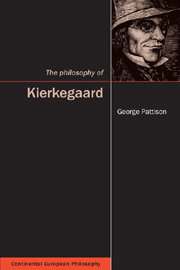Book contents
- Frontmatter
- Contents
- Dedication
- Acknowledgements
- Abbreviations and forms of reference
- Dedication
- Introduction: Kierkegaard and philosophy
- 1 Existence
- 2 Anxiety
- 3 The good
- 4 The infinite qualitative difference and the absolute paradox
- Epilogue: The Christian witness and the simple wise man of ancient times
- Notes
- Guide to further reading
- Index
Epilogue: The Christian witness and the simple wise man of ancient times
- Frontmatter
- Contents
- Dedication
- Acknowledgements
- Abbreviations and forms of reference
- Dedication
- Introduction: Kierkegaard and philosophy
- 1 Existence
- 2 Anxiety
- 3 The good
- 4 The infinite qualitative difference and the absolute paradox
- Epilogue: The Christian witness and the simple wise man of ancient times
- Notes
- Guide to further reading
- Index
Summary
In the very last of his works written for publication during his lifetime, the tenth number of the polemical pamphlet series called The Moment and dated September 1855, just weeks before his death, Kierkegaard made the following declaration: “The only analogy I have for what I am doing is Socrates. My task is the Socratic task of revising the definition of what it means to be a Christian. Therefore I do not call myself a Christian (keeping the ideal free), but I can make it plain that nobody else is either” (19 319/M 341). Both the content of this remark and its position in Kierkegaard's authorship – the last full-stop, as it were – give to it a singular pathos. But it was not just at the end of his life that Kierkegaard realized how important Socrates was to him. On the contrary, Socrates had been there from the beginning. Kierkegaard's Magister's dissertation of 1841 bore the title The Concept of Irony, with Constant Reference to Socrates, and Socrates would later play a conspicuous part in such key pseudonymous works as Philosophical Fragments (1844) and The Sickness unto Death (1849). Even in the more exclusively religious writings, Socrates makes regular appearances, often under the transparent incognito of “a simple wise man of ancient times”. Kierkegaard's relation to Socrates was therefore both complex and varied. It was complicated further by the way in which his interpretation of Socrates was entangled both with his negative relation to Hegel and his positive evaluation of predecessors such as Hamann and Lessing.
- Type
- Chapter
- Information
- The Philosophy of Kierkegaard , pp. 172 - 184Publisher: Acumen PublishingPrint publication year: 2005

